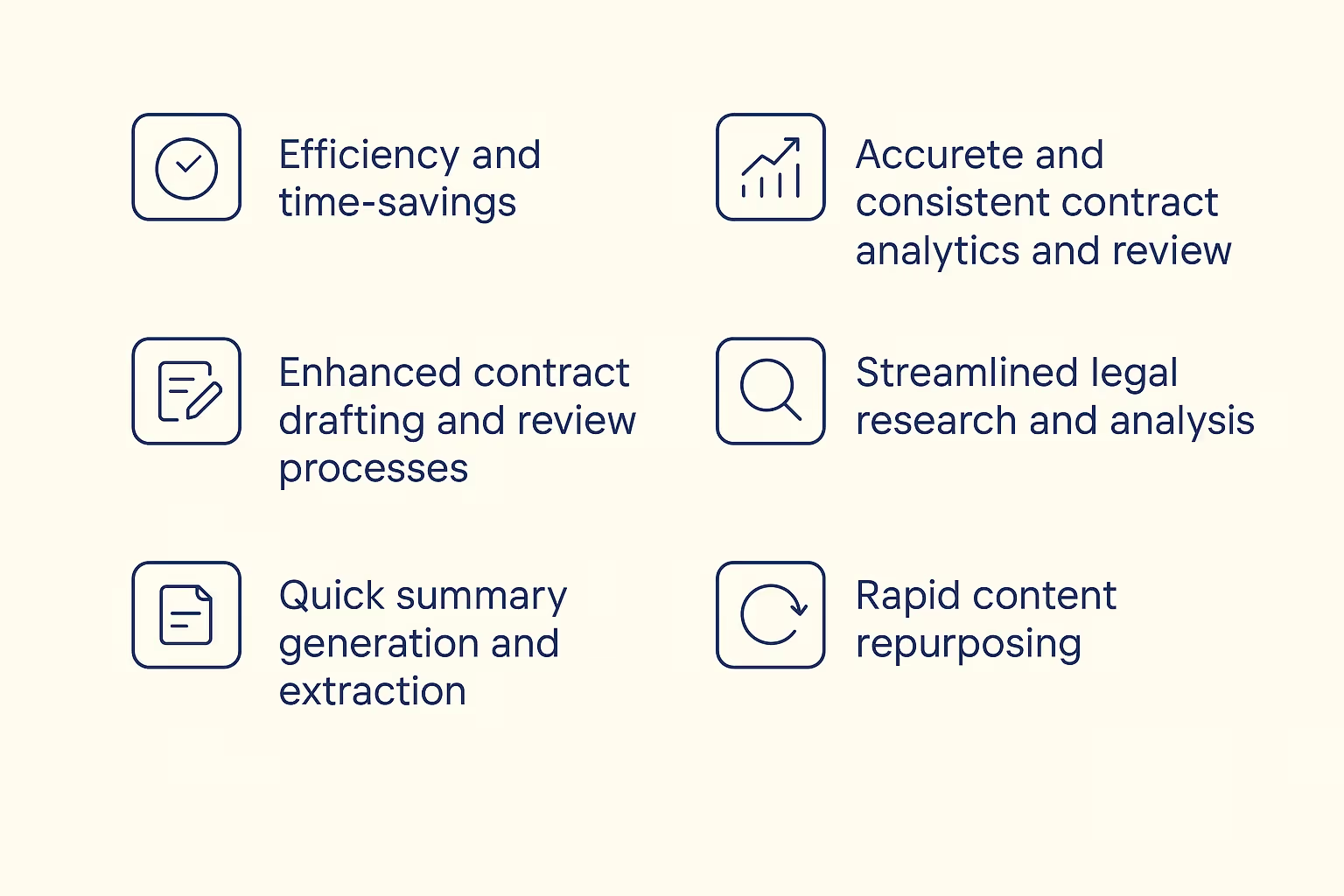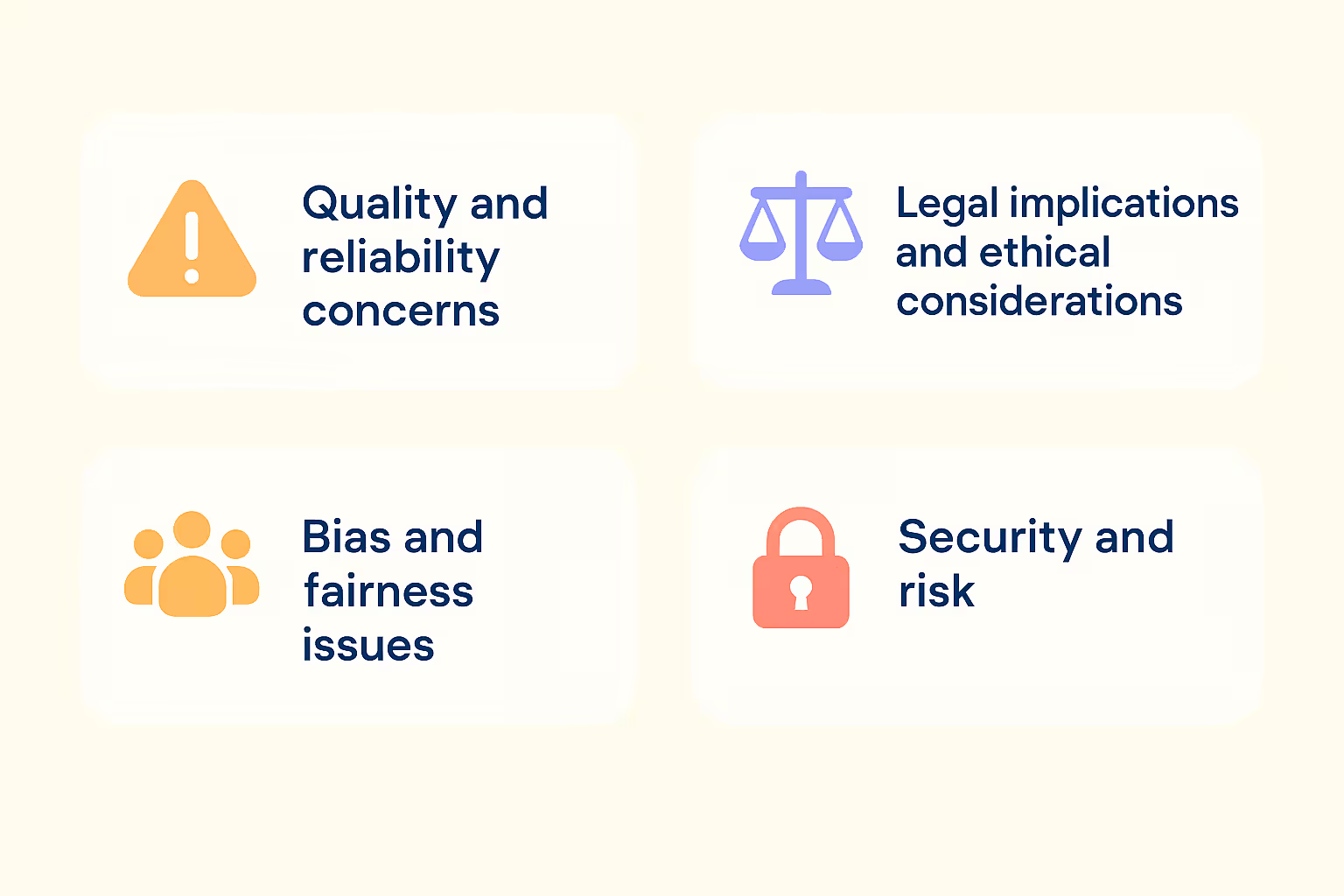(Update on 27th May, 2025)
Landmark generative AI company ChatGPT launched in November of 2022 and became the fastest-growing consumer application in history, gaining 100 million users in just two months. The subsequent AI boom led to billions of worldwide tech investments. The emergence of powerful Generative AI and new AI development has sparked both curiosity and speculation in the legal landscape.
In fact, a survey by Thomson Reuters indicates a prevailing optimism among in-house legal departments. More than 80% say that Generative AI can be applied to their law-specific work, while 54% say that it should be applied to legal work, and 70% say that it should be applied to non-legal work, as well.
Generative AI has immense potential to reshape how lawyers draft and manage contracts. However, anyone who is implementing must do so with caution. They need a detailed policy outlining safe and ethical contract management practices.
Also read: Free Step-By-Step Guide to Developing an AI Use Policy
Let's delve deeper into Generative AI, exploring its implications and possibilities for contract and legal teams. We'll also address the critical question of its safety, especially when legal teams use AI in contract-related tasks.
What is Generative AI?
Generative AI is a kind of artificial intelligence that has revolutionized the way machines create content. It can generate text, code, voice, images, videos, processes, and even the 3D structure of proteins.
It’s important to note that Generative AI differs from Predictive AI, another approach within the field of artificial intelligence. Predictive AI relies on labeled historical data to make predictions about future events. Individuals may use Predictive AI to forecast potential losses in insurance or estimate when equipment is at risk of failure.
Generative AI focuses on new and original content creation. Individuals may use Generative AI to summarize long, complex documents or automatically respond to emails.
At its core, Generative AI utilizes machine learning techniques to analyze existing data and generate new data. It leverages the power of two neural networks working in tandem.
Generative AI for in-house legal
One of the most applicable forms of Generative AI is text generation, in which AI produces written content that imitates human language patterns and styles. Text generation has found significant utility in the legal services industry, since it can automate previously laborious and time-consuming tasks.
For instance, Generative AI can automate document review and comparison, summarization, approvals, and the initial drafting of contracts or legal memos. Note that Generative AI is only as good as the information you feed it and can introduce small errors or lose nuance. Reviewing generated content ensures accuracy.
By using AI, professionals can focus on more complex and high-value work, like problem-solving with clients and drafting responses to novel legal situations. Shifting to using AI for more routine tasks like some text generation can not only enhance productivity but also open up opportunities for significant cost savings and growth within legal practices.
Also read: AI in Contract Management: Reviewing and Drafting Contracts Within Minutes
Generative AI benefits and use cases for in-house legal and contract teams
Generative AI offers numerous benefits for teams, revolutionizing their workflows and enabling them to deliver more efficient and accurate services across contract lifecycle management (CLM).

#1 Efficiency and time-savings
Generative AI automates repetitive and time-consuming tasks, like IP licensing review, contract drafting, and legal research, allowing you to focus your time and expertise on higher-value activities. You can accomplish more work in less time, leading to faster turnaround times and increased capacity to handle complex legal matters.
Generally, legal and contract AI works best when treated like a fast, overeager intern. It’s quick to finish a task, but can’t perform complex legal tasks without oversight. AI performs well in a detailed context (company type, use case, exact contract terms of concern). Prompts should specify role, purpose, and structure (e.g., “Review this MSA for indemnity, choice of law, payment terms…”).
#2 Accurate and consistent contract analytics and review
Unlike humans, who may experience fatigue or overlook details, Generative AI systems can meticulously analyze vast amounts of data without losing focus. This improves the accuracy of document review, contract analysis, contract creation, and legal research.
For example, a procurement team might need to review numerous third-party vendor contracts for risk exposure, renewal terms, liability clauses, and change-of-control provisions. AI can scan hundreds of documents for key risk patterns, clause anomalies, and business-critical data points. This accelerates the due diligence process and reduces manual review burden while maintaining accuracy.
#3 Enhanced contract drafting and review processes
By analyzing large datasets of existing contracts, Generative AI can provide intelligent suggestions and automate the creation of contract templates. It can identify potential issues, flag inconsistencies, and even propose alternative clauses based on specific requirements. This accelerates the contract drafting process, reduces the likelihood of errors, and ensures compliance with legal standards.
Generative AI can also streamline the contract review process by automatically extracting key information, comparing clauses, and identifying potential risks, enabling legal teams to review contracts more efficiently and thoroughly.
For example, an AI tool can review contracts like LinkedIn’s Subscription Agreement and identify non-cancelable, non-refundable payment clauses as risky.
Also read: How to Use AI Tagging to Power Your Contract Workflow
#4 Streamlined legal research and analysis
Generative AI enhances legal research and analysis by quickly sifting through vast amounts of legal information and extracting relevant insights. It can rapidly analyze case law, statutes, and legal precedents to support legal arguments and provide valuable legal research summaries. It can assist in identifying relevant legal sources, extracting key facts, and predicting outcomes based on historical data. This expedites the research process, enabling you to make well-informed decisions.
For example, AI can compare your contract to industry templates (e.g., Law Insider clauses) and identify differences in aggressiveness or protections.
#5 Quick summary generation and extraction
Generative AI excels at producing concise summaries of long texts or collections of texts, which can be invaluable in the legal field when summarizing due diligence reports, legal research findings, or legislative changes. The software uses natural language processing to provide natural language answers to questions in real time based on a given text or knowledge base.
This capability is particularly useful for legal self-service requests, efficiently addressing repetitive questions that require a level of legal insight. This may include daily summaries of court decisions, market regulations, or labor rules.
#6 Rapid content repurposing
Generative AI can transform content into new types, formats, or styles. This could involve simplifying complex legal language to make it more accessible and understandable. By utilizing Generative AI's ability to analyze and rephrase content, legal teams can effectively communicate legal concepts and documents to clients, stakeholders, or non-legal professionals.
Review all AI content for errors and erroneous details. AI is an excellent productivity tool but not a “set-it-and-forget-it” system.
AI may save hours of writing and reframing by creating a ready-to-send email that outlines new contract changes or recommendations with reasoning. All you need to do is review and hit send. Through this same process, AI can also aid in quickly framing contract negotiation communications.
Also read: How to choose the best AI contract review software
Also read: 8 Top Contract Management Software Platforms
How to safely implement generative AI: Issues and solutions

The use of public Generative AI for contract generation offers numerous benefits in terms of efficiency, speed, and convenience. However, it’s essential to carefully consider the safety implications associated with relying on public Generative AI tools to produce legally binding contracts.
Alternatively, SpotDraft AI is a private, in-house solution that offers privacy and safety not prioritized with public AI. Read on to learn more about SpotDraft and the issues and solutions for implementing public AI.
#1 Quality and reliability concerns
Generative AI may sometimes yield made-up responses or come up with different answers for the same question. Unreliable or erroneous Generative AI contracts can lead to significant legal disputes, financial losses, and damage to professional reputation. Ashley Armstrong of the University of Connecticut speaks to her experience with this phenomenon.
“When I asked research-related questions, ChatGPT spit back something that sounds very intelligent [and] provided a conglomeration of citations that look real but don’t actually exist."
~ Ashley Armstrong, Assistant Clinical Professor of Law, University of Connecticut
Generative AI and the Law
Secure AI that’s meticulously trained on legal content can overcome the quality issues of more general AI systems. This can be accomplished by leveraging legal-specific platforms, such as SpotDraft AI, or even transforming more generic Generative AI models into a custom system. Creating custom capabilities is expensive on the front end, but allows you to tailor the AI system to your specific needs and enhance the safety and ethical considerations in contract management.
Also read: Roadblocks to adoption of generative AI for in-house legal
#2 Legal implications and ethical considerations
Public Generative AI adoption for contracts raises important legal and ethical considerations. From a legal standpoint, it is crucial to determine the jurisdiction's requirements and regulations governing the use of AI-generated contracts. Take the advice of industry pro, Greg Lambert:
“The number one rule since the birth of the internet is ‘don’t do anything stupid’ online. You need to think ahead of time: are you and your client comfortable?”
~ Greg Lambert, Chief Knowledge Services Officer, Jackson Walker LLP
Ethical considerations include informed consent, transparency, privacy, and data security issues.
A few established legal tech providers are incorporating Generative AI into their platforms and overcoming these ethical concerns by ensuring compliance and supporting ethical practices at every step of the process. For example, SpotDraft AI helps you unlock a new level of productivity and gain valuable insights from your contracts while using the platform for contract drafting or information extraction.
With SpotDraft, you can:
- Generate contract templates instantly
- Conduct comprehensive due diligence on multiple contracts at once, and review contracts 7x faster with AI clause match
- Extract critical insights from your contracts, empowering better decisions across your organization
- Compare clauses with past versions side by side, and make quick changes
- Generate precise contract summaries to identify data trends and facilitate decision-making
Moreover, using our Microsoft Word plugin, Draftmate AI, you can turn any document into a SpotDraft contract template in less than five minutes.
#3 Bias and fairness issues
Generative AI systems learn from existing data. If that data contains biases or discriminatory patterns, the generated contracts will likely inherit these biases, too. This can lead to unfair or discriminatory terms and conditions, posing legal risks and undermining the principles of fairness and equal treatment.
Avoiding bias is critical to AI, and legal information providers are supporting anti-bias tech by developing Generative AI tools that provide AI capabilities on top of their existing knowledge bases. These tools, such as SpotDraft’s VerifAI, offer legal departments the ability to leverage AI for contract management while utilizing trusted and comprehensive legal content. Training AI technology on vetted, unbiased legal data helps ensure the contracting process is as ethical as possible.
Also read: How AI Is Changing Contract Management for Legal Teams
Also read: Alternative Legal Careers for Lawyers: 20 Realistic Ideas
#4 Security and risk
Cyberattacks against Large Language Models (LLMs) and internal security risks are a serious concern to any company utilizing this technology. At SpotDraft, risk management is not just a function—it’s a foundational principle. We have a security-first mindset and policies that protect customer data.
We utilize FIPS-140-certified encryption solutions to protect customer data and are GDPR compliant. In addition to our numerous security capabilities, including a PCI-compatible encryption scheme, we offer the following product security features to protect your contract data:
- Single sign-on (SSO): Seamlessly manage user access with SSO via OAuth (Office365, Google Workspace) or SAML (Okta, Active Directory, custom solutions). It supports zero-touch provisioning.
- Audit logs and version history: Track every contract action—creation, edits, signing—with detailed audit logs. A full version history ensures complete document traceability.
- Custom roles and permissions: Control access by contract type, department, or entity. Flexible, contract-level permissions support global organizational structures.
- Backups and disaster recovery: Strengthen business continuity and disaster recovery through a program that ensures service availability and fast recovery in case of disruptions.
Responsibly implementing Generative AI for contract management
While Generative AI can significantly streamline processes and increase efficiency, it can never replace the invaluable legal knowledge and judgment of lawyers. Instead, you can view AI as a powerful tool that complements and augments the capabilities of legal professionals.
Generative AI for contracts has the potential to transform the legal industry. It can automate routine tasks, improving efficiency and enabling more sophisticated legal risk management. This allows in-house lawyers to focus on higher-value work and drive growth opportunities.
However, responsible implementation, specialized models, and thoughtful integration of Generative AI into legal workflows are essential to harness its full potential and ensure accurate and reliable outputs.
To experience the benefits of Generative AI in contract management, request a demo of SpotDraft AI. SpotDraft AI offers specialized legal models and advanced automation features that enable seamless contract generation and management. Contact us today to see how SpotDraft AI can revolutionize your contract management processes.

.avif)
.avif)





